- Home
- Patrick O'Brian
The Mauritius Command Page 9
The Mauritius Command Read online
Page 9
It occurred to Stephen that McAdam was perhaps a somewhat seedy practitioner of this or any other art; a man furthermore whose inward torments were clearly printed on his face. But as they talked of the interaction of mind and body, of interesting cases they had seen—false pregnancies—inexplicable remissions—their experience afloat—the inverse relationship of constipation and courage—the proved efficacity of placebos—his opinion of McAdam rose: indeed, a mutual esteem came into being, and McAdam's arrogant, didactic tone grew even civil. He was telling Stephen about his patients aboard the Otter—most of the Otters were, sensu stricto, mentally deranged, and there was one case that McAdam would describe and name, were it not for professional secrecy, a fascinating and particularly subtle chain of symptoms—when without any warning Golovnin fell off his chair, grasping the orchids. He lay motionless, still in the attitude of sitting; but he fell sideways, a wholly inconclusive result. At the sound of the crash the landlord paced to the door and whistled. Two enormous sailors walked in, and murmuring, 'Come, Vasily Mikhailovitch; come, little father,' they carried their captain out into the darkness.
'He has not hurt my flowers, however,' said Stephen, smoothing their petals. 'They are, in their essentials, quite intact. You have no doubt remarked the curious spiral convolution of the ovary, so typical of the whole order. Though perhaps your realm does not extend to botany, at all?'
'It does not,' said McAdam. 'Though twisted ovaries are well within it; and twisted testicles too—I speak in figure, you understand: I am jocose. No. The proper study of mankind is man. And I may observe, Dr Maturin, that this eager prying into the sexual organs of vegetables on your part seems to me . . . '
What it seemed to Dr McAdam did not appear, for his tide too had now reached the full. He rose; his eyes closed, and he pitched straight into Stephen's arms, falling, as Stephen noted, forwards.
The landlord brought one of the wheelbarrows that he kept under the porch, and with the help of a black, Stephen wheeled McAdam towards the pier, passing several bodies of cheerful liberty-men as he went. He hailed each party in turn, asking for any Otters; but no man chose to leave the sheltering darkness and sacrifice a moment of his shore-leave, and Stephen heard nothing but facetious replies—'Otter's bound for the Rio Grande'—'Otter's paid off at the Nore'—'Otter was broke up for firewood last Wednesday week'—until he met a group of Néréides. A familiar voice cried, 'It's the Doctor,' and there was the powerful form of Bonden at his side, Jack Aubrey's coxswain from his earliest command.
'Bonden, sir. Do you remember me?'
'Of course I remember you, Bonden,' said Stephen, shaking his hand. 'And am delighted to see you again. How do you do?'
'Pretty spry, thank you, sir; and I hope I see you the same? Now just you shove off, Darkie'—to the black—'I'll take care of this here barrow.'
'The question is, Bonden,' said Stephen, giving the black two stuivers and a penny, 'the question is, how shall I find the means of conveying my charge to his ship, always supposing that his ship is here at all, which seems to be a matter of some doubt? He is the surgeon of the Otter, Bonden, a learned man, though somewhat original; and at the moment disguised in drink.'
'Otter, sir? She come in on the turn of the tide, not ten minutes ago. Never you fret, I'll square our boatkeeper directly and take him out.' He hurried away: a little later the Néréide's jolly-boat appeared at the step, and Bonden carried the body into it. In spite of the dimness Stephen noticed that Bonden moved stiffly; and this stiffness became more apparent as he pulled out across the harbour towards the distant sloop.
'You are stiff, Barret Bonden,' said Stephen. 'In another man I should say he had certainly been flogged; but that can scarcely be the case with you. I trust this is not a wound, or a rheumatism from the falling damps?'
Bonden laughed, but without much mirth, and said, 'Oh, it was four dozen at the gangway, all right, sir, and two more for luck: brass on the lock of the number seven gun not bright enough.'
'I am amazed, Bonden: amazed,' said Stephen, and indeed he was. Bonden had never been flogged to his knowledge; and even in a flogging ship fifty lashes was a savage punishment for anything but a most serious crime. 'And grieved. Let us row over to the Boadicea, and I shall give you some salve.'
'It's all right now, sir, thanking you kindly. I was aboard you this afternoon, but it was not for no salve: you will find the letter we wrote, a-laying there in your cabin.'
'What is it all about, tell?'
'Well, sir,' said Bonden, resting on his oars: but by this time they were close to the larboard side of the Otter, and in reply to her hall Bonden called, 'Your doctor coming aboard: request a line.' The Otter was perfectly used to this: a whip with a bowline appeared over the side; Bonden slipped it under McAdam's arms; and the surgeon vanished upwards.
'Well, sir,' said Bonden again, pulling slowly towards the Boadicea, 'this is the way of it. When me and Killick, on the Leeward Islands station, heard the Captain was afloat again, we went to join him, in course: and there was plenty more in other ships did likewise—old Sophies, old Surprises, even an old Polychrest, Bolton, that slab-sided cove the Captain pulled out of the sea. Oh, was he to new-commission a ship, he'd have no trouble finding a ship's company: not like some—' He swallowed the coarse expression with a cough and went on, 'Howsoever, we put in our request, and Captain Dundas, a very affable gent and a friend of the Captain's as you know full well, sir, discharged us into Néréide, Captain Corbett, for the Cape: which he was so kind as to say he was sorry to lose us, and give Killick a pot of guava-jelly for the Captain. But Néréide's short-handed: because why? because the men run whenever they can. There was Joe Lucas, of our mess, as swam three mile, with bladders, off St Kitts, sharks and all: was brought back, flogged, and swum it again, with his back like a raw steak. And today, with only twelve liberty-men out of the whole crew, two of 'em are off for the mountain, in spite of all them wild beasts, I know for certain fact, leaving thirty-eight months' pay and their prize-money. So, do you see, we are afraid, Killick and me and the rest, that Captain Corbett will not discharge us into the Boadicea; and so we wrote this letter to you, sir. Because not liking to put ourselves in the Captain's way, being that he's to hoist his pennant any minute as they say, and therefore too busy, we hoped you might put in a good word, just casual, at the right moment.'
'Of course I shall. But you could very well have addressed Captain Aubrey himself; he has the kindest recollection of you—often speaks of his real coxswain, and much regrets your absence.'
'Does he, though?' said Bonden, with a chuckle of satisfaction. 'But even so, we'd take it very kind in you to say a word: it would come more proper, like, from you. And we are main anxious to be out of Néréide.'
'She is not altogether a happy ship, I collect?'
'No, sir, she ain't.' He rested on his oars again, and looking a little sideways at Stephen he added, 'She's a shot-rolling ship: that's what she is.'
Stephen knew nothing about the sailing of ships, theoretical or practical; but he did know that when a crew started trundling cannon-balls about the deck under the cover of darkness, then something was very much amiss; for the next stage was mutiny. He also knew that in any normal ship it would be unthinkable for an unusually steady, sober man like Bonden to be flogged.
'I'm not complaining, mark you,' said Bonden. 'Nor I'm not setting up in judgment: there are some right bastards in the Néréide, before the mast and elsewheres; and when things reach a certain pitch, in such a ship the cat falls on the just and the unjust alike. I can take fifty lashes as well as the next man, I hope; though I may say as how it was the first time the cat and me came acquainted—oh, I was beat like a drum when I was a little chap in the Thunderer, but that was only the master-at-arms' admonition, as we say. His cane, sir. No. What I mean is, that in the first place me and Killick and the rest want to get back to our own captain: and in the second, we want to get out before things turn nasty. And at the gait they are going now—well
, I shouldn't give much for Captain Corbett's life, nor some of his officers, come an action, or even maybe a dirty night with no moon; and we want no part in it.'
'Ugly, Bonden, very ugly,' said Stephen, and no more until they were alongside the Boadicea, when he said, 'Good night, now; and thank you for rowing me home.'
He turned in with Leguat's Voyage, with its fascinating account of the solitaire, and Sparmann; and late in the middle watch he heard Jack come aboard. But it was not until quite late in the morning that they met, Stephen having been called to the sick-bay to deal with an alcoholic coma that had suddenly started to gush blood at the ears; and when they did meet it was clear to him that both his crapulous night and his crapulous morning (the sick-bay had smelt like a distillery) were to be prolonged. Captain Aubrey had the yellow, puffy look of one who has drunk far too much—so much indeed that his twenty-mile ride back had not worked it off. 'Twenty miles, more than twenty miles, on a damned screw that flung me down three times, and spoilt my best nankeen trousers,' he said. His steward had broken the coffee-pot: his French cook had gone ashore with Bretonniere to join the other prisoners of war, and never more would there be brioche for breakfast. But infinitely more than even the missing coffee was the fact that the Admiral had promised Jack his orders and had not produced them. An interminable, inconclusive conference with the Governor, Mr Farquhar and two general officers of a stupidity remarkable even for the army: then an equally long supper with the soldiers, determined to make their guest drunk. And all this while no orders. By the time Jack set off on his glandered mare the Admiral had long since gone to bed; the flag-lieutenant knew nothing about any orders, written or even contemplated. So here he was, as he told Stephen in the cabin, not knowing where he was: there had been no word about his pennant at any time. So here he was, left hanging up in the air: perhaps the expedition would not take place at all: and if it did, after months of delay, perhaps he was not intended to command at all—there had been a furtive, evasive look in the eye of the Admiral's secretary, an ill-looking, untrustworthy swab, for all he was a parson. There had been no mention of higher command in his original sailing orders, and although the Admiral had certainly spoken as though the matter were settled, the appointment no doubt lay at his discretion: the Admiral might have changed his mind: he might have been influenced by the opinion of the council. And then earlier there had been that ominous 'if you hoist your pennant'.
'Let us take a turn on deck,' he said. 'My head seems to be made of hot sand. And Stephen, might I beg you, implore you, not to smoke those vile things in the cabin? It is your pot-house all over again, like that soldiers' mess last night.'
They reached the quarterdeck in time to see an odd figure come up the side, a young man dressed in a gaudy coat and a little gaudy hat. He had come up the starboard side, the officers' side, and as he advanced towards Mr Seymour he saluted. The first lieutenant hesitated: not so Jack. 'Turn that fellow off the ship,' he roared. Then, in a lower voice, holding his hand to his aching forehead, 'What the devil does he mean by it, prancing about the deck of a King's ship improperly dressed, like a Jack-pudding?' The young man got into a boat, and was rowed away by a crew of merry-andrews, all in much the same kind of rig.
Jack's steward cautiously sidled near, muttering something about 'the gun-room's pot', and Stephen said, 'I believe he means that coffee's up.'
It was: and as they drank it benignity returned, helped by fresh cream, bacon, eggs, pig's fry, the last of the true French short bastards, toasted, and Sophie's orange marmalade.
'I am sorry I was so cursed snappish just now, about your cigar,' said Jack, pushing back his chair at last and undoing his waistcoat. 'Pray smoke, Stephen. You know I like the smell.'
'Ay,' said Stephen. He broke a cigar in three, crumbled one piece, moistened it with a few drops of coffee, rolled it in paper, and lit it with a voluptuous indraught. 'Listen, now, will you?' he said. 'Bonden, Killick and some others are aboard the Néréide, and wish to return to you. All tastes are to be found in nature, we are told; and it is to be presumed that they like the brutal, arbitrary, tyrannical exercise of power.'
'Oh,' cried Jack, 'how very, very pleased I am! It will be like old times. I have rarely regretted anything so much as having to part with them. But will Corbett ever let them go? He's devilish short-handed; and it's only a courtesy, you know, except to a flag. Why, a man like Bonden is worth his weight in gold.'
'Corbett does not seem to be aware of his value, however: he gave him fifty lashes.'
'Flogged Bonden?' cried Jack, going very red. 'Flogged my cox'n? By God, I . . .'
A nervous young gentleman brought the news that the Commander-in-chief's flag-lieutenant had been seen putting off from the shore and the captain of the Otter from his sloop, and that Mr Seymour thought Captain Aubrey might like to know.
'Thank you, Mr Lee,' said Jack, and he went on deck: Lord and Lady Clonfert had been far, far from his mind, but they came back with a rush as he saw the Otter's gig, pulled by the same merry-andrews of just before breakfast, approaching the Boadicea. It was at about the same distance as the Raisonable's barge, but the flag-lieutenant paused by the flagship to exchange a bellowed and apparently very amusing conversation with a friend on her poop, and before it was over the gig was alongside.
Clonfert was piped aboard, a slight, strikingly handsome, youthful-looking man in full uniform with a star on the bosom of his coat and a singular expression of expectation and uneasiness on his face. He flushed as Jack shook his hand, saying, 'I am happy to see you again, Clonfert; but I heartily wish I had better news for you. Come into my cabin.' Once there he went on, 'I am very much concerned to tell you, that because of an unfortunate misunderstanding about the time, I was obliged to leave Plymouth without Lady Clonfert.'
'Oh,' said Clonfert, with a look of bitter contrariety on his mobile face. 'I was afraid that might be so. I sent early to enquire, but it seems that the message I sent by one of my officers could not be received.'
'An officer?' cried Jack. 'I had no notion—an officer, in that rig?'
'I am sorry it did not meet with your approval, sir,' said Clonfert stiffly. 'But it is my custom to dress my gig's crew in my own colours—it is usual enough in the service, I believe—and the gentlemen under my command fall in with my humour. I confess it is irregular, however.'
'Well, it can lead to misunderstanding. Still, it is cleared up now, and I have delivered my damned unwelcome news—I regret it extremely, but I am sure that Lady Clonfert will have taken the next Indiaman. She will have travelled in much greater comfort, and she should be here within the next week or so, for we made but a slow passage of it. You will dine with me? We have a sucking-pig, and I recall you was fond of sucking-pig in the Agamemnon.'
Clonfert flushed again at the name of the ship: he darted an intensely suspicious glance at Jack, and then with an artificial air he said he must beg to be excused—with infinite reluctance he must plead a previous engagement—but that in taking his leave he must be allowed to express his sense of Captain Aubrey's great politeness in having intended to bring Lady Clonfert to the Cape; he was pénétré, pénétré.
He brought it off well enough to make Jack, whose conscience was far from easy on that score, feel something of a scrub; and if he had not tripped on his way out of the cabin the performance would have been well-nigh perfect. The flag-lieutenant was already on deck, talking and laughing with Seymour, when Jack saw his visitor to the side; and Jack's searching eye saw that the jolly young man was the bearer not of the unimportant inconclusive temporizing verbal order that he had so dreaded—that he had so reasonably dreaded, from the tone of last night's conference—but of an important folder bound up with tape, red official tape.
In the cabin once more he received the folder; but first he had to listen to the flag-lieutenant's message. 'The Admiral desires me to say, sir, that he was taken unwell just after the meeting; that he was unable to give you your orders as he had intended; but that he dictated
them from his bed at the earliest possible moment. In fact, sir, he dictated them to me, the secretary not being in the way.'
'So you know what is in them, I dare say?'
'Yes sir; and may I be the first to wish you joy of your pennant, sir?'
'Thank you, Mr Forster,' said Jack, with the full sun lighting up his heart and bowels, his whole being. 'Thank you very much indeed. I trust the Admiral's indisposition causes him no pain or distress? I could wish him restored to the most amazing health and happiness immediately.' The flag-lieutenant thought that perhaps the Admiral had eaten something; for his part he had recommended a dose of rhubarb; and Jack listened to him with an appearance of steady solicitous attention. Jack looked decently solemn, but his mind was swimming in happiness, a happiness made all the more wholly concrete, real and tangible when the flag-lieutenant's recollections of an occasion upon which he too had eaten something came to an end and Jack could cut the tape and see that his orders were addressed to Commodore Aubrey. Yet underlying this pure felicity there was another level of consciousness, a hard, sober determination to come straight into direct contact with the 'real thing', to see exactly what it amounted to, to gauge the limits of his possible initiative, to weigh up the forces in presence, and to start dealing with the situation at once.
The orders were clear, concise, and urgent: the Admiral had obviously had his way. Commodore Aubrey was directed and required to repair aboard the Raisonable; to hoist his pennant; to take the ships and vessels named in the margin under his command; to proceed to sea with the utmost dispatch; to seek out and destroy the French cruisers operating south of 10°S and west of 70°E, and, with the cooperation of the officer commanding the land forces on Rodriguez (which were to be reinforced at the appropriate juncture), to undertake the reduction of the French possessions of the Ile Bourbon, otherwise Ile de la Réunion, otherwise Ile Buonaparte, and of the Mauritius, otherwise Ile de France, together with that of the French ships and vessels in the seas thereto adjacent: he was to attend to the general directions in the attached schedules A and B; and in all political matters or those having a bearing on contact with the civil population he was to seek the advice of William Farquhar, Esquire, H.M. Governor-Designate, and in the absence of Mr Farquhar then that of Dr Stephen Maturin.

 The Final Unfinished Voyage of Jack Aubrey
The Final Unfinished Voyage of Jack Aubrey The Rendezvous and Other Stories
The Rendezvous and Other Stories Caesar: The Life Story of a Panda-Leopard
Caesar: The Life Story of a Panda-Leopard The Hundred Days
The Hundred Days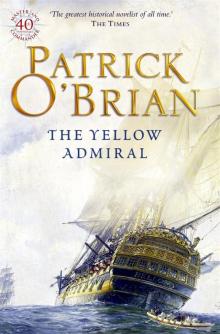 The Yellow Admiral
The Yellow Admiral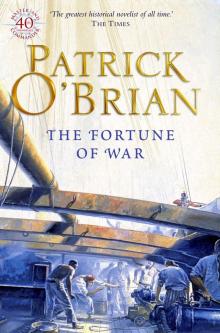 The Fortune of War
The Fortune of War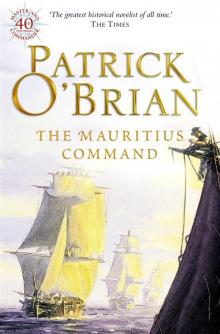 The Mauritius Command
The Mauritius Command Beasts Royal: Twelve Tales of Adventure
Beasts Royal: Twelve Tales of Adventure A Book of Voyages
A Book of Voyages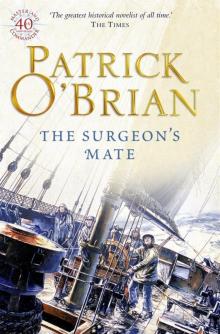 The Surgeon's Mate
The Surgeon's Mate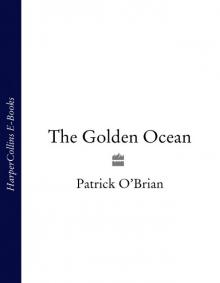 The Golden Ocean
The Golden Ocean Hussein: An Entertainment
Hussein: An Entertainment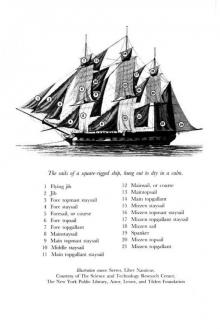 H.M.S. Surprise
H.M.S. Surprise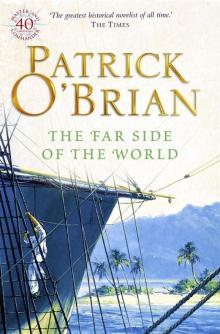 The Far Side of the World
The Far Side of the World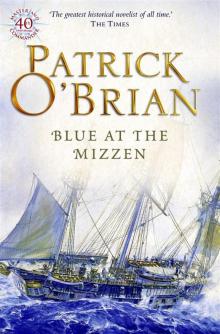 Blue at the Mizzen
Blue at the Mizzen The Unknown Shore
The Unknown Shore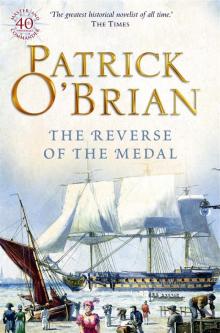 The Reverse of the Medal
The Reverse of the Medal Testimonies
Testimonies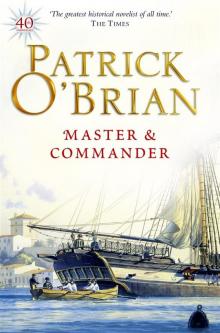 Master and Commander
Master and Commander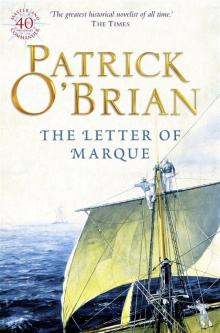 The Letter of Marque
The Letter of Marque Treason's Harbour
Treason's Harbour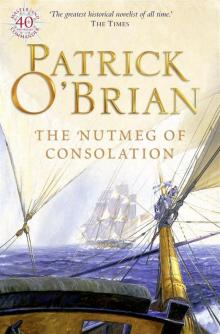 The Nutmeg of Consolation
The Nutmeg of Consolation 21: The Final Unfinished Voyage of Jack Aubrey
21: The Final Unfinished Voyage of Jack Aubrey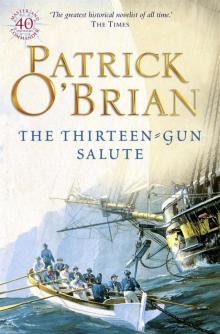 The Thirteen-Gun Salute
The Thirteen-Gun Salute The Ionian Mission
The Ionian Mission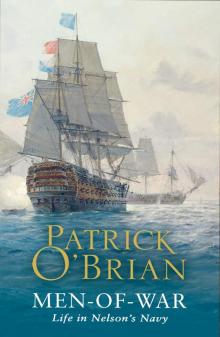 Men-of-War
Men-of-War The Commodore
The Commodore The Catalans
The Catalans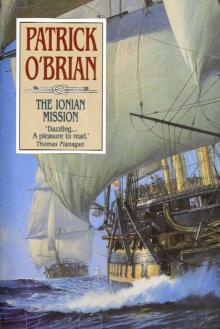 Aub-Mat 08 - The Ionian Mission
Aub-Mat 08 - The Ionian Mission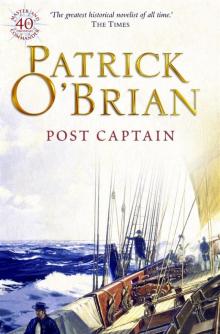 Post Captain
Post Captain The Road to Samarcand
The Road to Samarcand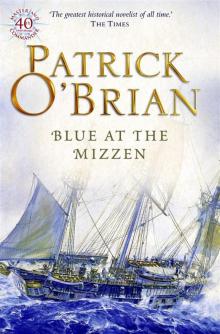 Book 20 - Blue At The Mizzen
Book 20 - Blue At The Mizzen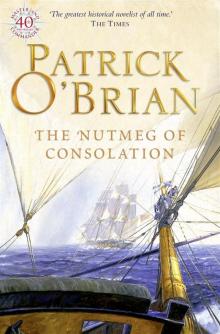 Book 14 - The Nutmeg Of Consolation
Book 14 - The Nutmeg Of Consolation Caesar
Caesar The Wine-Dark Sea
The Wine-Dark Sea Book 8 - The Ionian Mission
Book 8 - The Ionian Mission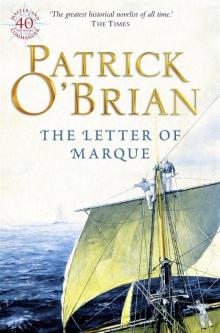 Book 12 - The Letter of Marque
Book 12 - The Letter of Marque Hussein
Hussein Book 9 - Treason's Harbour
Book 9 - Treason's Harbour Book 19 - The Hundred Days
Book 19 - The Hundred Days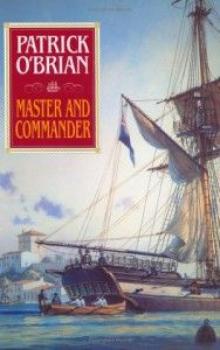 Master & Commander a-1
Master & Commander a-1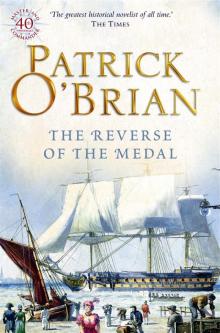 Book 11 - The Reverse Of The Medal
Book 11 - The Reverse Of The Medal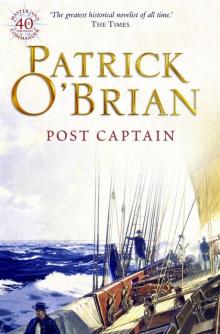 Book 2 - Post Captain
Book 2 - Post Captain The Truelove
The Truelove The Thirteen Gun Salute
The Thirteen Gun Salute Book 17 - The Commodore
Book 17 - The Commodore The Final, Unfinished Voyage of Jack Aubrey
The Final, Unfinished Voyage of Jack Aubrey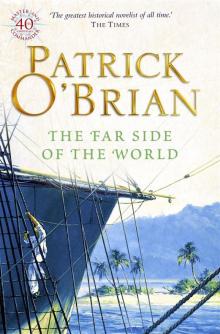 Book 10 - The Far Side Of The World
Book 10 - The Far Side Of The World Book 5 - Desolation Island
Book 5 - Desolation Island Beasts Royal
Beasts Royal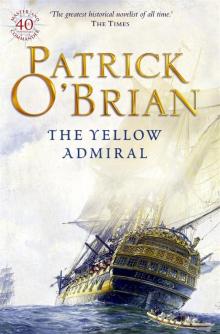 Book 18 - The Yellow Admiral
Book 18 - The Yellow Admiral Book 15 - Clarissa Oakes
Book 15 - Clarissa Oakes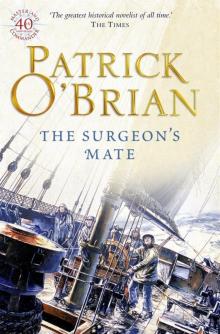 Book 7 - The Surgeon's Mate
Book 7 - The Surgeon's Mate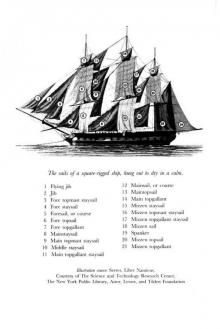 Book 3 - H.M.S. Surprise
Book 3 - H.M.S. Surprise Desolation island
Desolation island Picasso: A Biography
Picasso: A Biography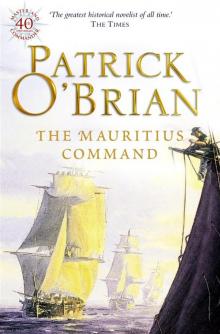 Book 4 - The Mauritius Command
Book 4 - The Mauritius Command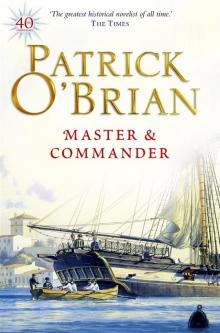 Book 1 - Master & Commander
Book 1 - Master & Commander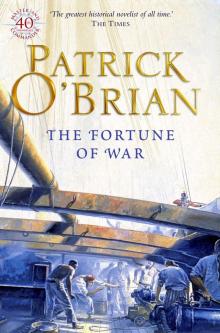 Book 6 - The Fortune Of War
Book 6 - The Fortune Of War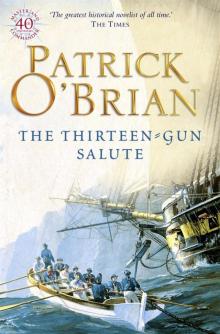 Book 13 - The Thirteen-Gun Salute
Book 13 - The Thirteen-Gun Salute Book 16 - The Wine-Dark Sea
Book 16 - The Wine-Dark Sea